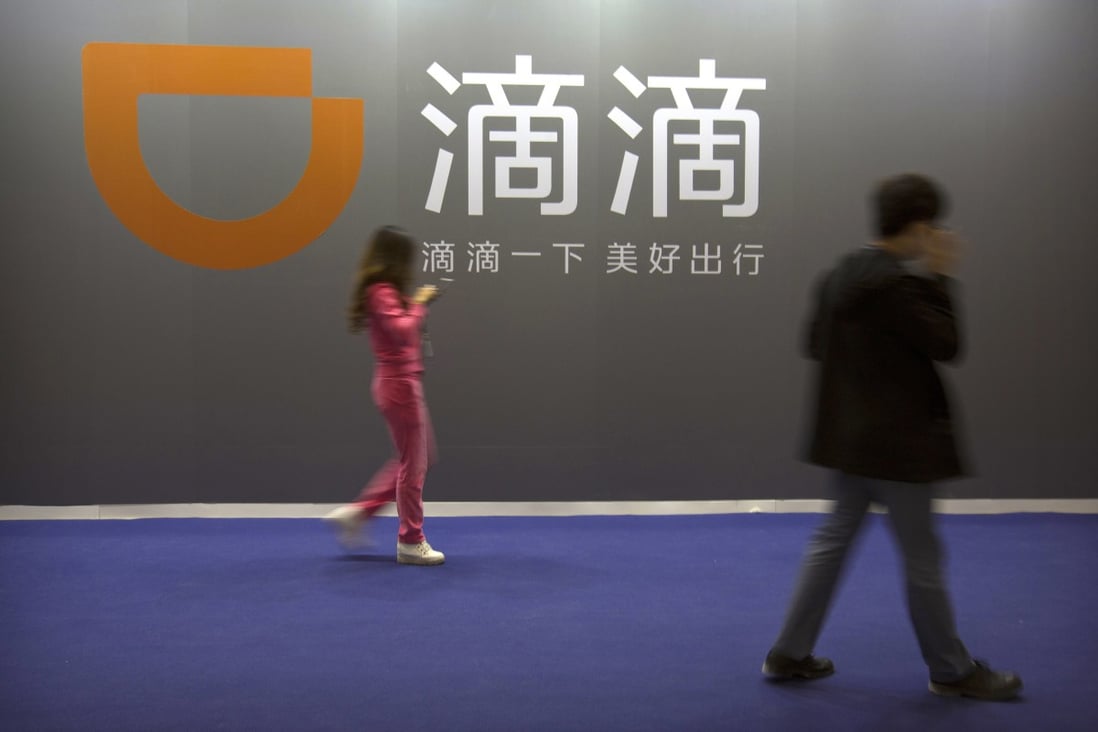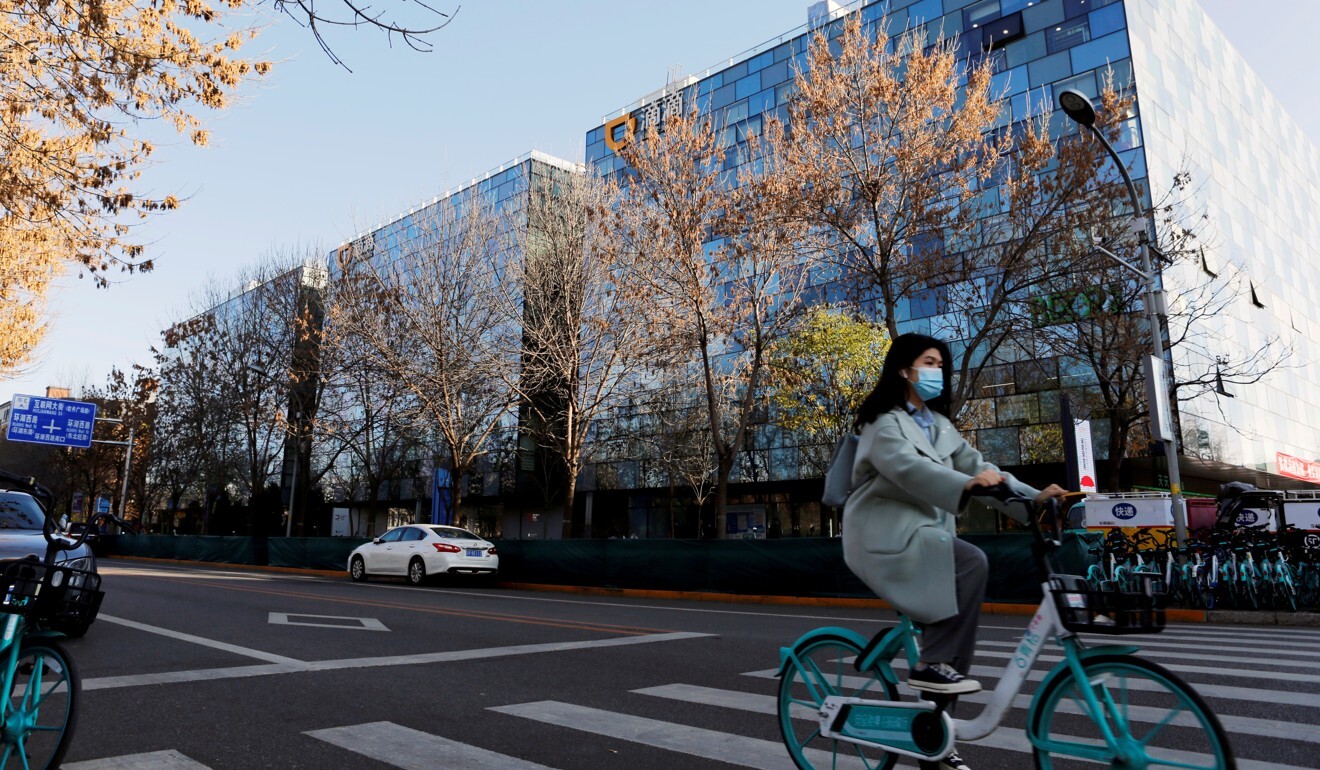
Investors poured billions into Chinese ride-hailing giant Didi Chuxing’s blowout IPO in New York on Wednesday, ending the first half of the year with a record amount of capital raised by Chinese companies in US markets.
As many as 36 Chinese companies raised US$12.59 billion in US markets in the first half of this year, the highest amount on record, according to Dealogic.
Despite worsening geopolitical tensions between the two countries, Didi raised US$4.4 billion on Wednesday in an upsized sale that valued the company at about US$70 billion, an astronomical number for a company that has yet to turn a profit.
US investors were buying into the growth story of Didi, which was started as a ride-hailing app in 2012 by Alibaba alum Cheng Wei, as it branches out to develop and manufacture electric vehicles and autonomous cars in China.

Alibaba owns the South China Morning Post.
Didi’s successful debut shows how much Washington and Wall Street are at odds with each other when it comes to investing in China.
As lawmakers warn investors against putting money in companies that can help Beijing advance its technology, fund managers continue to eye fast-growing tech firms from China propelled by disruptive or emerging technologies.
Didi closes little changed from IPO price in New York Stock Exchange debut
Washington’s “efforts to force financial decoupling between the US and China have made little progress despite ongoing tensions, investment bans, and the threat of delisting, ” said Nicholas Borst, director of China research at Seafarer Capital Partners, a California-based investment adviser focused on emerging markets.
Didi’s IPO has come at a time when regulatory hurdles have been mounting for Chinese companies tapping the US capital markets.
Late last year, the Holding Foreign Companies Accountable Act aimed at Chinese companies listed in the US passed with strong bipartisan support and became law. US listed foreign companies will be suspended from the exchanges after failing to hand over audits to US regulators for three straight years.
In May, the Public Company Accounting Oversight Board (PCAOB) that oversees audits of public companies followed up with a proposed draft rule to investigate auditors outside the US as a way to speed up implementation.
Most recently, the Senate passed a bill that would allow regulators to kick out foreign companies on the bourses faster if they do not comply with audit rules for two years instead of three.
“I frankly cannot see any scenario where any Chinese companies are listed on US exchanges, say from 2025 onwards, if that [PCAOB] provision is going to stay there,” said Paul Krake, founder of investment research firm View from the Peak, in an online discussion last week. “I don’t see how that’s [to be] overcome.”
France to investigate fashion retailers for Xinjiang crimes
US President Joe Biden in June signed an executive order to ban US investment in Chinese companies that Washington said have ties with the Chinese military. The list, which included Huawei Technologies, Hikvision, and China Telecom, was expanded to 59 companies under the Biden administration, a sign that tighter scrutiny over Chinese firms will continue.
“What President Biden’s White House has done with this new order is to say ‘we’re going to take President Trump’s idea, and we’re going to put in on sturdier legal and procedural footing,” said Mario Mancuso, head of the international trade and national security team of law firm Kirkland & Ellis. “We’re seeing a White House – with bipartisan help from Congress – fund, configure and fortify the US regulatory apparatus to better sustain a prolonged competition with China.”
The tighter regulation and the risks that come with it were not lost on both the Chinese companies and US investors. Some recent IPOs flopped soon after they began trading.
Full Truck Alliance, an app that connects truck drivers to businesses that need to move goods in China, made its US stock market debut last week. In May, Chinese insurance technology company Waterdrop listed its shares on the New York Stock Exchange. Shares of both companies have fallen below their IPO prices.

The New York Stock Exchange and Nasdaq declined to comment.
Didi told potential investors before the debut that legislation and additional rules were risks for its shares to be underperforming or be delisted, according to its IPO document. Didi said it recorded US$21.6 billion in revenue last year and stressed tremendous possibilities in its home turf, saying “China’s massive and urbanising population presents opportunities for new mobility services.”
The level of interest in US IPOs among Chinese companies has held up despite new rules that threaten to delist them several years down the road.
The number of Chinese companies listed on US equity markets have risen 14 per cent in the seven months ended May 5, according to a report by the US-China Economic and Security Review Commission, a congressional advisory body. As many as 248 Chinese companies were listed on major US stock exchanges – Nasdaq, the New York Stock Exchange, and NYSE American – up from 217 on October 2.
During that time, 17 Chinese companies were delisted from US exchanges, including Semiconductor Manufacturing International Corporation (SMIC) and the China National Offshore Oil Corporation (CNOOC).
US agency urges UN to investigate alleged rights abuses in China
Didi’s success demonstrates how much US investors were willing to look past Washington’s tightening grip around Chinese companies.
Investors continued to “see a case for greater exposure to China-related assets for potential returns and diversification”, said analysts at asset manager BlackRock.
While US-China conflicts remained among the top risks, “we believe investors are compensated for these risks” and “we expect persistent inflows to Asian assets as we believe many global investors remain underinvested and China’s weight in global indices grows”, the analysts said in an investment note.
The recent reprieve of a couple of Chinese companies under the Biden administration also offered hope that things may be stabilising.
Xiaomi and Luokung Technology, two companies on US government’s blacklist, were allowed to remain on the exchanges after federal judges ruled in favour of the businesses.
“However, if recent events have taught us anything, it’s that the US -China relationship remains highly volatile,” said Seafarer’s Borst. “There are a wide variety of issues, ranging from human rights to technological competition, that remain as flash points.”
But for now, “market participants on both sides seem to be operating under an assumption that the audit dispute can be resolved and that investment bans targeting Chinese companies will not be widened”, said Borst.
Additional reporting by Robert Delaney







